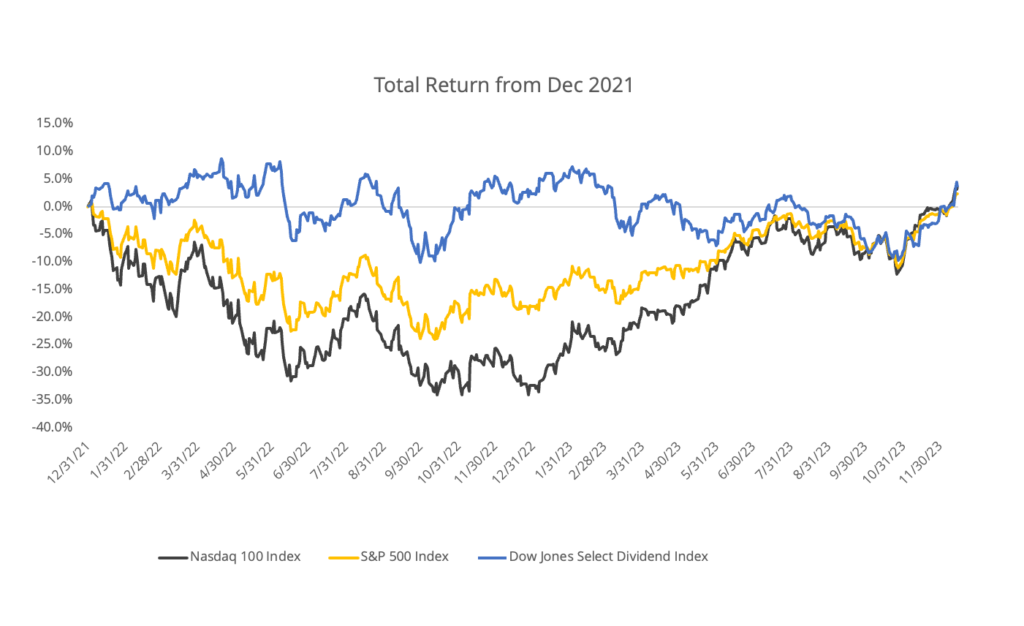How are the “Magnificent 7” stocks really doing?
Outperformance isn’t always exactly what it seems to be.
Many investors this year have been hungrily eyeing the Nasdaq 100 (up 53% year to date) and positively salivating over that index’s “Magnificent 7”—the tech and AI stocks (including Amazon, Apple, and Nvidia) that collectively have soared 104%. Meanwhile, some investors are viewing the S&P 500’s year-to-date return of “only” 25% as anemic and disappointing in comparison.
But pull back a bit—generally a good idea when an asset class goes on a short-term big streak—and
a far different picture emerges (see the chart).
Over roughly the past two years, from December 2021 (the market’s previous high point) to the new
highs we saw last week:
- The Nasdaq 100 is up just 3.60% during this two-year period.
- The Dow Jones Select Dividend index is up 3.21% over that time—a mere 0.39% lower than
the Nasdaq 100. - Among those “Magnificent 7” stocks, four are in negative territory (Google, Amazon, Meta,
and Tesla).

With all the recent tech stock hype, it’s easy to forget that the Nasdaq 100 struggled last year—plummeting -32%. Its gains in 2023 have essentially been a giant game of catch-up.
In stark contrast, dividend stocks—generally known for their relative stability—gained 2.3% in 2022
and are up about 1% this year.
The upshot: From late 2021 to now, investors in dividend stocks find themselves in about the same
place as investors in the Nasdaq 100. The big difference: The dividend investors avoided the
stomach-churning roller-coaster ride that Nasdaq investors experienced.
The prospect of 50%-plus returns in a year is clearly enticing. Just remember they may come with
some high costs that could undermine a goals-based investment plan.
This commentary is written by Horizon Investments’ asset management team. All returns are sourced from Bloomberg and as of 12/15/23. Regardless of dividend rates, net returns will be lower after accounting for fees and other portfolio costs. Past performance is not indicative of future results. Nothing contained herein should be construed as an offer to sell or the solicitation of an offer to buy any security. This report does not attempt to examine all the facts and circumstances that may be relevant to any company, industry, or security mentioned herein. We are not soliciting any action based on this document. It is for the general information of clients of Horizon Investments, LLC (“Horizon”). This document does not constitute a personal recommendation or take into account the particular investment objectives, financial situations, or needs of individual clients. Before acting on any analysis, advice, or recommendation in this document, clients should consider whether the security in question is suitable for their particular circumstances and, if necessary, seek professional advice. Investors may realize losses on any investments. Asset allocation cannot eliminate the risk of fluctuating prices and uncertain returns. All investing involves the risk of loss. The S&P 500 is a stock market index tracking the stock performance of 500 of the largest companies listed on stock exchanges in the United States. The Nasdaq 100 Index is a stock index of the 100 largest companies based on modified market capitalization trading on Nasdaq exchanges. The Dow Jones U.S. Select Dividend Index aims to represent the U.S.’s leading stocks by dividend yield. Reference to an index does not imply that any account will achieve returns, volatility, or other results similar to that index. An index’s composition may not reflect how a portfolio is constructed in relation to expected or achieved returns, portfolio guidelines, restrictions, sectors, correlations, concentrations, volatility or tracking error targets, all of which are subject to change. Individuals cannot invest directly in any index. Indices are unmanaged and do not have fees or expense charges, and dividend reinvestment makes no assumption about taxes, both of which would lower returns. The investments recommended by Horizon Investments are not guaranteed. There can be economic times when all investments are unfavorable and depreciate in value. Clients may lose money. This commentary is based on public information that we consider reliable, but we do not represent that it is accurate or complete, and it should not be relied on as such. Opinions expressed herein are our opinions as of the date of this document. These opinions may not be reflected in all of our strategies. We do not intend to and will not endeavor to update the information discussed in this document. No part of this document may be (i) copied, photocopied, or duplicated in any form by any means or (ii) redistributed without Horizon’s prior written consent. Forward-looking statements cannot be guaranteed. Other disclosure information is available at www.horizoninvestment.com.Horizon Investments and the Horizon H are registered trademarks of Horizon Investments, LLC©2023 Horizon Investments LLC.
